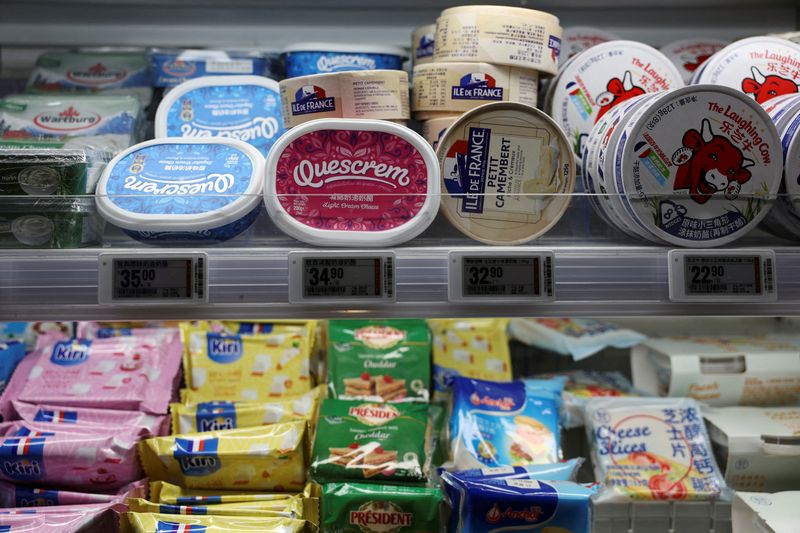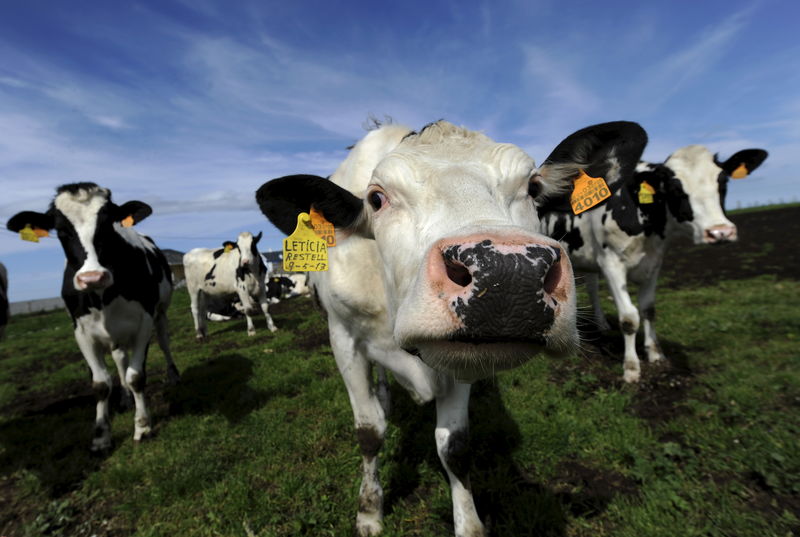By Mei Mei Chu and Joe Cash
BEIJING (Reuters) -China opened an anti-subsidy probe into dairy imports from the European Union on Wednesday, stepping up tension with the bloc a day after Brussels published its revised tariff plan for China-made electric vehicles.
The EU on Tuesday revised its proposed punitive duties on imports of Chinese EVs to 36.3% from an initial planned duty of 37.6%, but fell short of abandoning them, as Beijing had called on Brussels to do.
The revision drew rebuke from China's commerce ministry, which in response said it is "firmly opposed to and highly concerned" about the findings, and vowed to take all necessary measures to protect Chinese firms.
The anti-subsidy investigation on dairy announced by China's commerce ministry on Wednesday, the latest in a series of Chinese probes this year into EU agricultural goods, will focus on various types of cheeses, milks and creams intended for human consumption.
It was prompted by a complaint submitted by the Dairy Association of China and the China Dairy Industry Association on July 29 on behalf of the domestic dairy industry, the ministry said.
China will examine 20 subsidy schemes from across the 27-strong bloc, specifically those from Austria, Belgium, Croatia, Czech Republic, Finland, Italy, Ireland, and Romania, it said in a statement.
European Commission spokesperson Olof Gill said the bloc "will firmly defend the interests of the EU dairy industry and the Common Agricultural Policy, and intervene as appropriate to ensure that the investigation fully complies with relevant World Trade Organization rules."
The European Dairy Association, meanwhile, said it was confident that EU farm subsidies were compatible with World Trade Organization rules and would seek to clarify "the dairy part of the rather complex trade relation between China and the EU today".
Of the EU countries listed by China's commerce ministry, Ireland is by far the biggest exporter of dairy products to China, having sold $461 million worth of goods to the Asian nation last year.
French dairy sector body CNIEL said France was also part of the EU-wide Chinese probe, adding that the country was China's second-largest supplier of cream after New Zealand.
The EU was China's second-largest source of dairy products with at least 36% of the total value of imports in 2023, behind only New Zealand, according to Chinese customs data.
The EU exported 1.7 billion euros ($1.84 billion) in dairy products to China in 2023, down from 2 billion in 2022, according to data from the European Commission's Directorate-General for Agriculture and Rural Development, which cited Eurostat.
China already launched an anti-dumping probe into imports of EU pork in June, which mainly affects Spain, the Netherlands and Denmark, following an anti-dumping investigation into EU brandy announced in January that was almost exclusively related to France.

"The combined value of EU pork and dairy exports to China —areas of goods potentially affected by tariffs — are smaller than the value of China's battery EV exports to the EU, which we estimate to stand at around $13.5 billion in 2023," Chim Lee, senior China analyst at the Economist Intelligence Unit, said.
"Domestic economic pressures, alongside the increasingly important role played by external demand in supporting China's economy, will keep Chinese policymakers cautious about invoking an overly confrontational approach to trade," Lee added.
